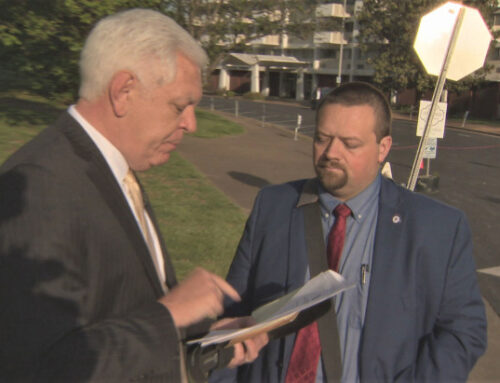NASHVILLE, Tenn. (AP) – News media organizations on Thursday asked the Tennessee Supreme Court to rule that some police records should be open to the public, even during an investigation and trial, while attorneys for the government argued that court rules put those records off-limits.
The Tennessean requested police records involving former Vanderbilt football players charged in the 2013 rape of a fellow student in a campus dormitory. Metro Nashville Police denied the request and the newspaper sued, along with other news media organizations, including The Associated Press.
At a Thursday hearing, government attorneys argued that a court rule protects evidence in a police file from public scrutiny until after a trial and all appeals are complete.
Lora Fox, representing the Metro Nashville government, said the court rule is an exception to the Tennessee Public Records Act, which requires most government documents to be open for public inspection. There would be no need for the rule if anyone could sidestep it by filing a public records request, she said.
Janet Kleinfelter, representing the state and the Nashville district attorney general, warned that anything less than closing all the police records until after prosecution could make it impossible to conduct a fair trial, “a fair determination of guilt or innocence.”
Robb Harvey, arguing for the news media organizations, said the court rule does apply to some police records, just not all of them. The rule in question specifically names records that are “made by the district attorney general or other state agents or law enforcement officers” and “statements made by state witnesses.”
Records that are not covered by the rule should be considered public records, Harvey said. Tennessee residents should be able to obtain those records through a Public Records Act request.
In a brief to the court, he wrote that access to the records provides “transparency for the acts of local officials and the justice system.”
If some of those public records need to be kept secret, they can be sealed by a protective order, Harvey argued in court. That is what happened in the Vanderbilt rape case where the criminal court judge placed protective orders on documents that include photos, videos and medical records.
The justices asked Harvey about the potential misuse of police files by criminals seeking to find what evidence investigators may have against them.
“A records request can be made by anyone, not just responsible media outlets,” Justice Holly Kirby said. “How does this play out beyond this case?”
Justice Cornelia Clark asked about records that are gathered by police during an investigation but ultimately not relevant to the case. She asked how it is fair for those to become public.
Chief Justice Sharon Lee told the government attorneys that the court has previously rejected the idea of a blanket public records exception for law enforcement. She also said the General Assembly has expressed its intent for the Public Records Act to be construed broadly, with narrow exceptions.
“So the starting point is openness,” she said.
Meanwhile, attorneys for victim Jane Doe asked the court to rule that her right to be free from harassment, intimidation and abuse – guaranteed by the Tennessee Constitution – creates another exception to the Public Records Act.
Her attorneys said records that degrade the victim should never be released to the public, even after the trial.
Lee asked about the scope of the victim’s request.
“Taking it to the next logical step, there could almost be no public trial, no cross-examination,” she said. “There have to be some limits on this protection.”
Attorney Ed Yarbrough answered, “That’s why we need the guidance of the highest court in the state.”




